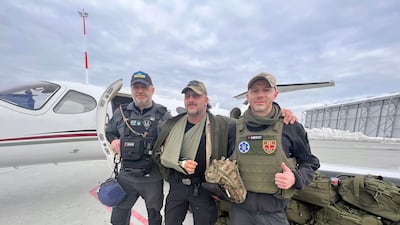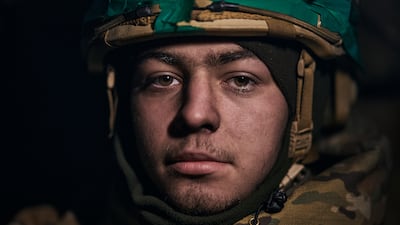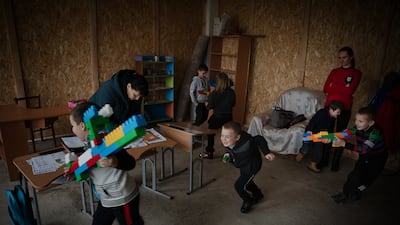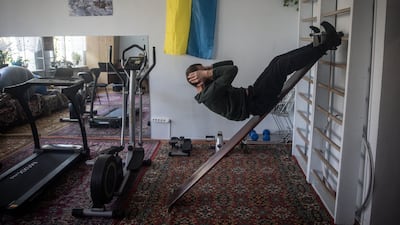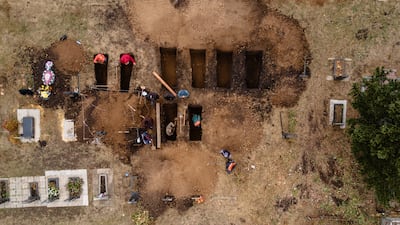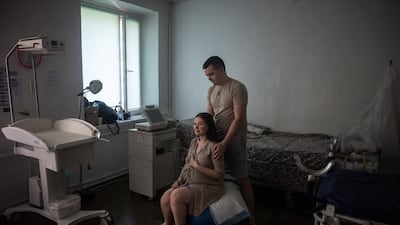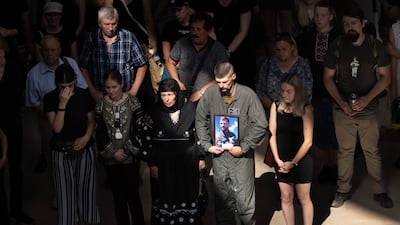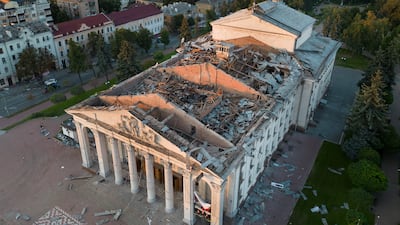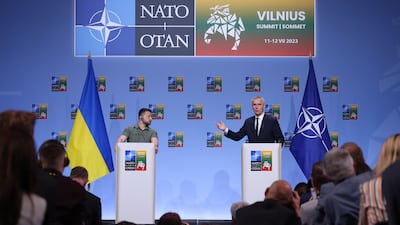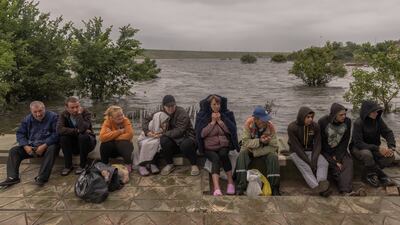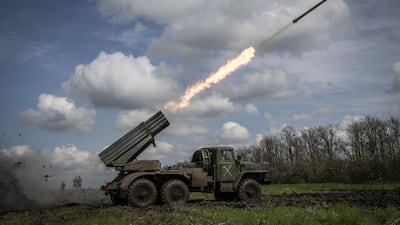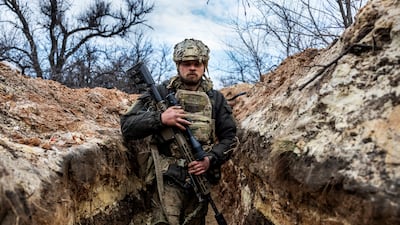When Russia's war with Ukraine began, a small band of volunteers felt driven to help, but they had little idea that they would be dedicating the next two years to saving lives.
From travelling thousands of kilometres in snow and ice to deliver aid and equipment to Ukrainian hospitals to saving the lives of injured soldiers on the frontline or repatriating the dead, the group has been striving to do their bit to bring a humanitarian victory to Ukraine.
Ewan Cameron, from Scotland, first went to Ukraine a month after the war broke out to help rescue a friend, but the tragedy he witnessed there inspired him to stay and help.
He set up the charity ReactAid to bring in medical supplies and to help evacuate the wounded.
His team compromises trauma medics with a mutual desire to help.
Manchester midwife Wendy Warrington met Mr Cameron as she helped refugees to flee the conflict.
Inspired by her Polish grandfather George Bielski, who survived Auschwitz and gave evidence at the Nuremberg trials, Ms Warrington travelled to Poland at the outbreak of the conflict.
When she saw the devastation, she was compelled to leave the safety of the border and use her medical skills closer to the lines of Russian attack.
Now she and Mr Cameron have built a network of medics whom they supply with equipment, from incubators to ultrasound machines and clothes.
British men rescue dozens of injured soldiers
Mr Cameron and co-worker Craig Borthwick, a former counter-terrorism officer, do more than merely supply hospitals.
Conducting midnight missions to rescue troops from the trenches at the heart of Ukraine’s war is a far cry from Mr Cameron's earlier career as a DJ opening for Basement Jaxx and Calvin Harris.
But when he found himself caught up in the war while on a mission to rescue a friend he decided to train as a trauma medic.
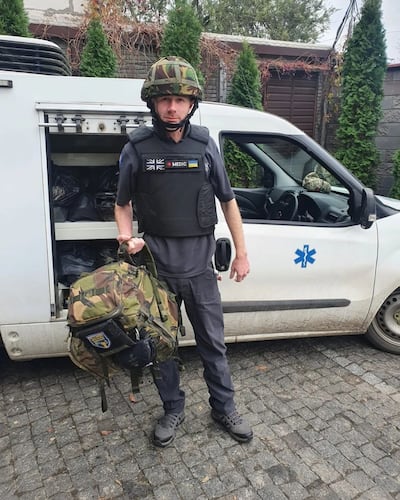
“When we first crossed the border, there were 10,000 people queuing. It was like a football stadium emptying but it just didn’t stop. We saw people lying down in the snow and then we realised they were dead. We knew we needed to do more,” he told The National.
“Originally, I went to Ukraine to help one person but my heart wouldn’t let me go home. There were too many children dying, it was awful. I had strangers trying to hand me their children asking me to save them.
“We realised if we could help one person, we could help another and it just snowballed.
“I didn’t envisage any of this. We are not soldiers, we just go off and do our mission and try to save people.
“We try to give the same care as we would if they were our own family members. We have been very successful and are driven by a goal to help.”
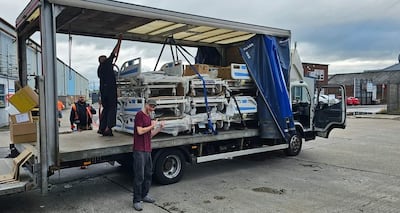
Working with a network of international volunteers, they hire planes and equipment and go to the frontline.
To date, they have saved the lives of dozens of medics and troops.
“We started helping evacuate international volunteers when they got hurt. They were like James Bond-style missions, we’d hire helicopters through our contacts to take them to Germany or Poland,” he said.
“We go to the hardest hit places to get the fallen.”
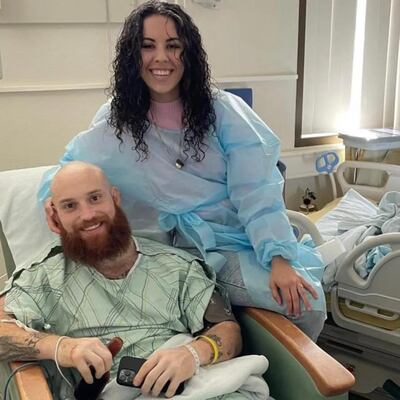
The team rescued British volunteer fighter Shareef Amin from the trenches.
They then had to take him 600 kilometres across Ukraine to get him to the border and a plane to life-saving treatment in the UK.
In another case, they helped US Army Iraq veteran Brian Harlow, who was in Ukraine helping to train troops.
He stepped on a landmine, resulting in the loss of his right lower leg. It took seven hours to evacuate him.
For all their successes, they have dealt with immense sadness.
At Christmas, they helped to repatriate the body of Bristol University graduate Katherine Mielniczukm 26, who went to Ukraine to use her medical skills.
This month, they are planning a mammoth mission to move 130 elderly and orphans from the east of Ukraine to the west.
Midwife's life-saving incubators
Ms Warrington is inspired by her family history.
“My grandfather was in Auschwitz for two years before he was liberated and was a key witness at Nuremberg,” she said.
“My great grandmother and her sister were killed there (Auschwitz), so when the war started two years ago and I saw what was happening, it resonated with me,” she told The National.
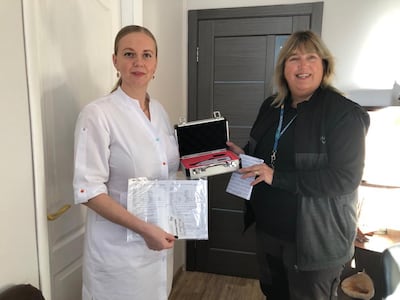
“Being a midwife, I couldn’t sit back and watch when I saw the scenes of queues, in the freezing conditions, of children and babies. I speak Polish and I found myself an official place to go to the crossing to help on March 13, 2022.
“I realised we were not seeing any pregnant women, so I started going around and explaining I was a midwife and word spread,” she said.
“Gradually I began helping pregnant women who had been standing for hours on packed trains, in freezing conditions and often had not felt their babies move.
“I was able to give them check-ups and reassure them and check their baby’s heartbeats and the mums would just cry with relief. From there, I started to go to the train station, where people were coming in, to help them directly.”
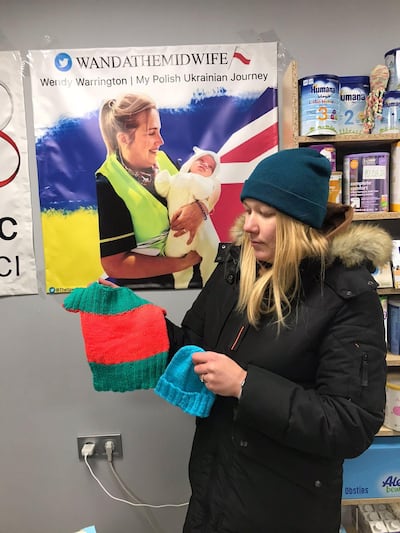
What was meant to be a three-week mission took up two years of her life.
“I promised my family I would not cross into Ukraine but within a week I took an ambulance full of aid into Mariupol and Lviv to a children’s hospital and started to evacuate children with cancer,” she said.
“We take MOM incubators which are highly portable and do not have to be plugged in, so if a baby is born in a bunker or needs evacuating during the bombing to a place of safety they can be saved.”
The incubators cost £11,500 each and a Rotary Club charity helped to buy them.
Without her team of supporters across the UK, Ms Warrington's work would be impossible.
An army of knitters and fund-raisers
“I support a children’s centre in Kharkiv and I get a monthly cargo of aid from Huddersfield Voices of Ukraine. They ask me what I want and send it over,” she said.
“I have an army of knitters across the country knitting special blankets for the incubators, twiddle muffs for people with dementia, we make baby boxes with hats, bootees and cardigans, toiletries for the mums and knitted blue and yellow hearts with messages for the mums to let them know we are thinking about them.”
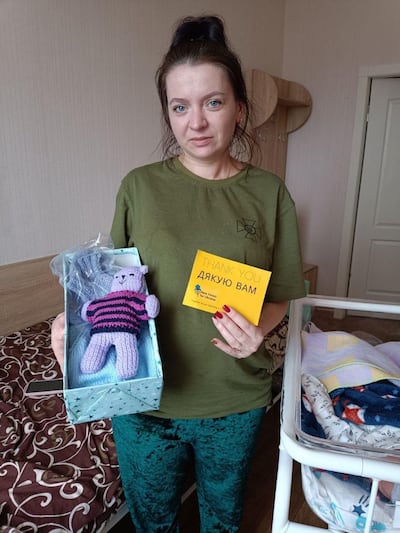
This month will be Ms Warrington's 17th mission to Ukraine. Looking into the eyes of the young people she is helping keeps her going.
“All I can see is my grandchildren, my children. It just seems so close to home, and I hope someone like me would get off their backsides and go to help if this was my family,” she said.
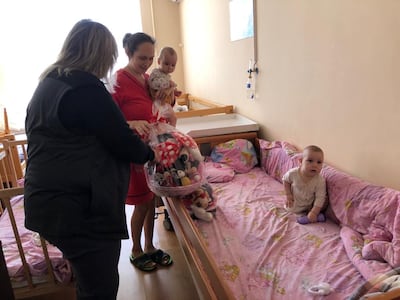
Food and weapons for the troops
British volunteer Richard Woodruff was selling advertising for a business magazine when he was moved by a video of Russian tanks rolling into Ukraine.
It led to him leaving the UK to go to help feed and supply Ukrainian troops.
“For the first six months, I helped in the kitchens and made dehydrated meals for the troops,” he said.
“They didn’t have enough food and supplies and there were no logistics in place for hundreds of thousands of men. Lots of food was being made by grandmothers in their homes, and I was sent out to deliver it for six months.
“I started up a social media account to appeal for frontline kit and to document my life as a volunteer.’’
With more than 62,000 followers on X, Mr Woodruff raises funds for everything from food parcels and thermal imaging drones to rebuilding schools and homes.
“We find out what they need on the ground in real-time so we can really understand what’s going on. They really need more thermal weapon drones. They can fly up high and view the whole battlefield and see the Russian troops glowing in the dark so they can see if they are running to their positions,” he said.
“I have no regrets about what we are doing,” he said.
“There is not a single day I take off from working towards victory. The first day I will take a break is when the war is over, but only for a day before the rebuilding begins.”
